There’s no disputing the convenience of online transactions in today’s digital world. Nowadays, just about anyone can send and receive money over the Internet within seconds. As one of the pioneers in the world of online payment systems, we have PayPal to thank for many of these developments. Unfortunately, this convenience can come at a cost — enter the wide world of PayPal scams!
PayPal scams have become a much bigger problem than most people realize. Cybercriminals use them to defraud unsuspecting users and wreak financial havoc. But that’s where this guide comes in! Here, you’ll gain all the needed insights on how to identify and avoid these scams.
Let’s jump in!
What exactly are PayPal scams?
In a nutshell, PayPal scams collectively refer to the many nefarious strategies cybercriminals may employ to trick PayPal users into things like providing their login information or an unwarranted payment. While these scams vary in terms of methods, they all have the same goal — to take advantage of the confidence that most people have in the PayPal brand.
As for the consequences, these too depend on the (hopefully) swift action a victim initiates in the aftermath and extent of the scam attempt. With a bit of luck, the troubles will only result in minor annoyance, but you should know they may lead to a serious case of identity theft.
But fear not—with this guide, you’ll learn everything you need to know about how these scams operate and how to take the right steps to protect yourself.
Why is it important to know how to avoid PayPal scams?
Of course, if you haven’t fallen victim to a PayPal scam before, you might be wondering how this guide is relevant to you. However, that it has never happened to you does not guarantee that it will not happen in the future.
In truth, PayPal scams are quite pervasive and unfortunately, it’s only going to get worse in the coming years. After all, cybercriminals are ever more numerous, skilled and hungry to find ways to exploit digital vulnerabilities. A global financial powerhouse like PayPal is a prime target for scammers.
Consider the recent study by Intel, which states that PayPal’s fraud rate is around 0.17 to 0.18 percent of its revenue. This may seem like a small figure, but it translates into billions of dollars lost every year to fraudsters. We are sure you don’t want to add to that statistic; the best prevention is to study up on how not to become the next victim.
Is PayPal safe to use?
Now that we are on the subject of PayPal scams, you may wonder if PayPal is safe to use at all. The answer is “yes” — when used with adequate caution and preventative measures in place.
The good news is that PayPal has not been idle on the matter. The company has implemented more security measures to combat this threat (and keep their brand’s reputation strong). These measures include advanced fraud detection tools, encryption, and buyer protection policies.
With that said, there are still risks involved which apply to any online platform. Cybercriminals are always looking for new vulnerabilities to exploit. So, whether you use PayPal or other payment transfer platforms, it’s always a good idea to stay vigilant when dealing with financial transactions online.
Common PayPal scams
Now that we’ve established the existence and potential risks of PayPal scams, it’s time to understand how these scams work.
Scammers use a variety of tactics to defraud unsuspecting users. This includes sending PayPal scam emails and setting up fake websites.
How does PayPal scams work?
The following are some of the most common types of PayPal scams to look out for:
PayPal money request scams
One strategy used by PayPal scammers is to send a fake money request on the platform itself simply. Often, these requests appear to be from reputable companies or individuals you may recognize. However, one thing to consider is that these requests almost always involve a sense of urgency.
Consider this example: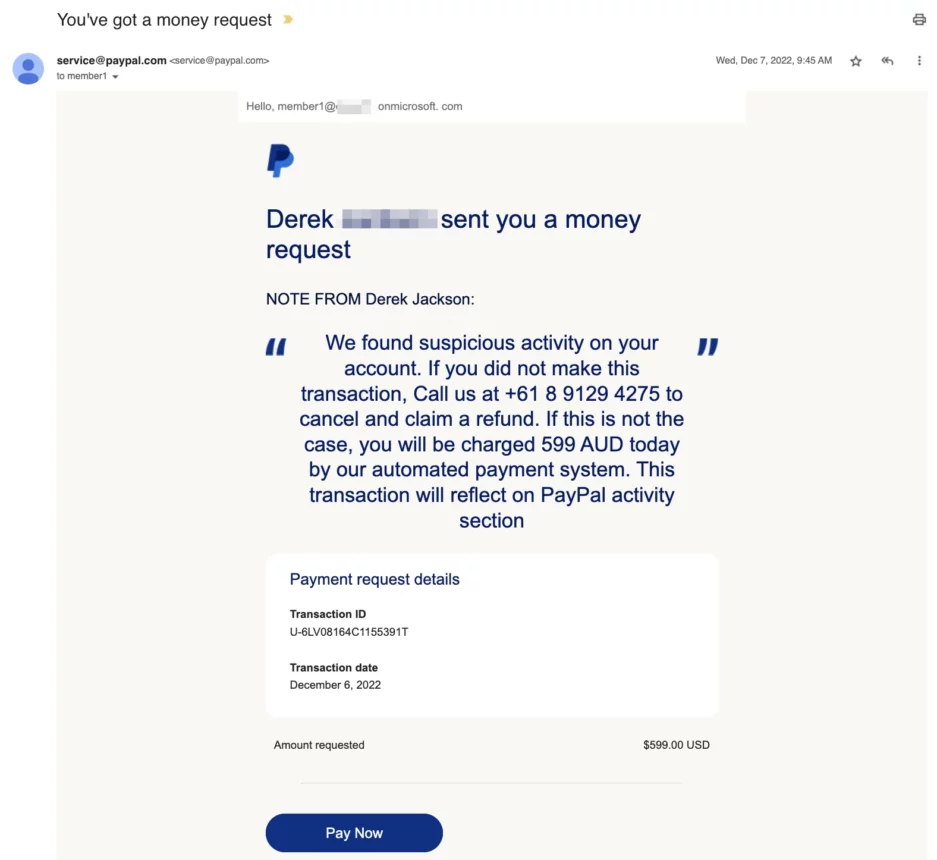
PayPal doesn’t allow threatening messages when sending money requests. However, a $1000+ charge from out of nowhere is sure to cause concern. In many cases, it’s enough for potential victims at least to call the fake phone number indicated in the money request.
One thing to remember is that legitimate organizations will never approach their customers this way. If you receive an unexpected or suspicious money request, do not call or click any links within the message. Instead, log into your PayPal account directly through the official website. From there, you’ll be able to verify the request’s legitimacy.
PayPal invoice scams
Invoice scams are another common method employed by fraudsters. In this scenario, the scammer sends a fake invoice that looks like an authentic PayPal invoice. The invoice will appear to be from a known seller or service provider, and it will probably list an item you did not order or a service you did not request.
The scammer’s goal is to trick you into paying for something you didn’t purchase. If you receive an invoice for an item or service that you don’t recognize, do not pay the invoice or click on any links within it. Instead, log into your PayPal account directly from the PayPal website and check your transaction history. If the invoice doesn’t appear in your history, it’s likely fraudulent.
Here’s an example of a PayPal invoice scam: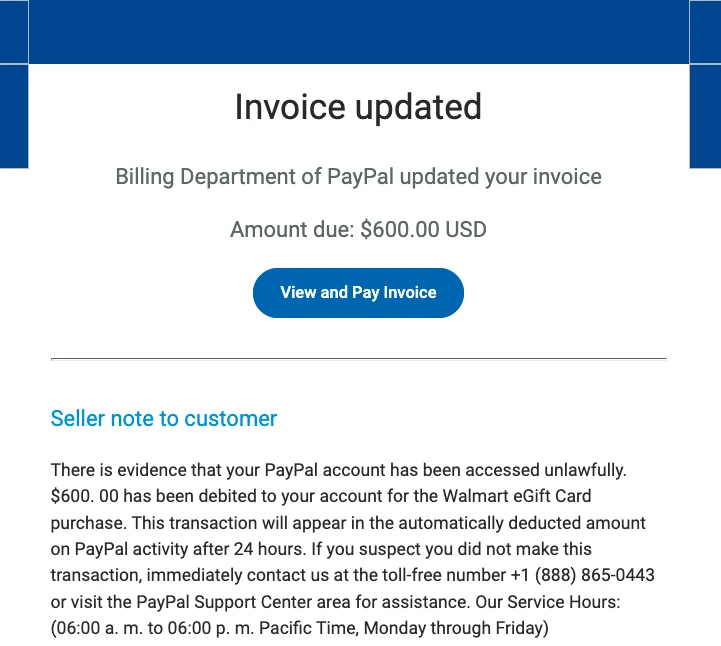
Avoid calling the number on a suspicious invoice, but instead report it to PayPal’s customer service immediately. It’s always better to be safe and double-check than to fall for a potential scam.
PayPal refund scams
Refund scams represent yet another common deception strategy used by scammers. In these instances, fraudsters often pose as buyers, initiating a transaction with a seller. After the seller sends the product or service, the scammer files a refund claim with PayPal. The scammers will either claim that they never received the item or that it wasn’t as described. They might even return a different item instead of the original, further complicating the situation.
Here’s one end result of what a PayPal refund scam might look like: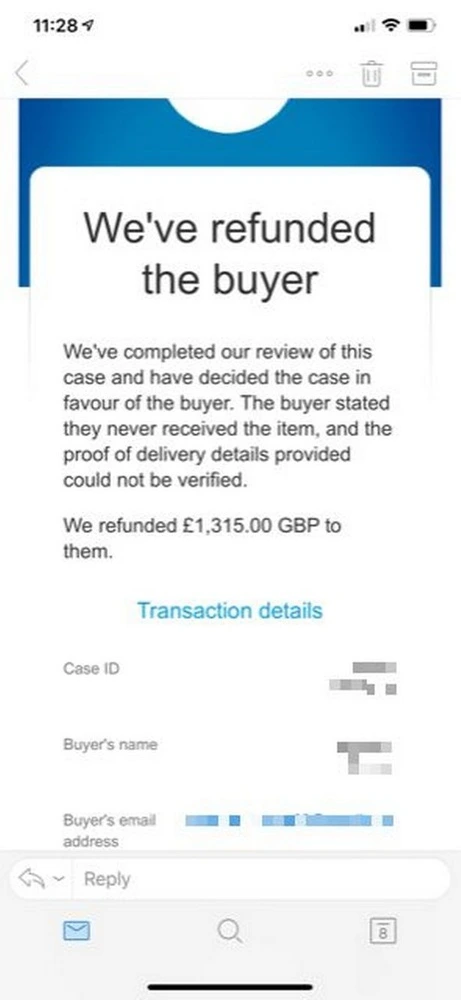
Imagine you’ve just sold something expensive and shipped it to the buyer, only to find that the buyer opened a case with PayPal claiming that they never received the product. If you cannot provide enough evidence to dispute the claim, then PayPal may refund the payment, leaving the seller at a loss.
To protect yourself from refund scams, keep detailed records of all transactions. This includes shipping and delivery confirmations. When dealing with high-value items, consider using a delivery service that requires a signature upon receipt.
PayPal chargeback scams
Chargebacks are slightly different from refund scams, but the underlying concept is similar. In a chargeback scam, the fraudster makes a payment using PayPal and receives the product or service as expected. However, they then file a “chargeback,” claiming that the transaction was fraudulent or unauthorized.
As you might imagine, this can result in significant losses for the seller, who may have already shipped the product or provided the service. To protect yourself from chargeback scams, be sure to verify all PayPal transactions. More importantly, make sure to keep accurate records of all orders and payments.
Note that with chargebacks, you’d be dealing with multiple parties (PayPal as well as the relevant financial institution). Therefore, it’s important to have as much evidence as possible to prove that the transaction was legitimate.
PayPal phishing scams
Phishing scams are yet another prevalent form of PayPal fraud. In this case, scammers send an email or text message that appears to come from PayPal. Such messages often contain alarming messages such as reports of suspicious activities. These messages usually contain a link that directs you to a fake PayPal login page, created expressly to steal your login credentials.
The phishing page may look convincingly like PayPal’s actual website, but it’s a trap. If you enter your login details, the fraudsters will capture them. This means that they’ll be able to access your PayPal account, leading to unauthorized transactions and monetary losses.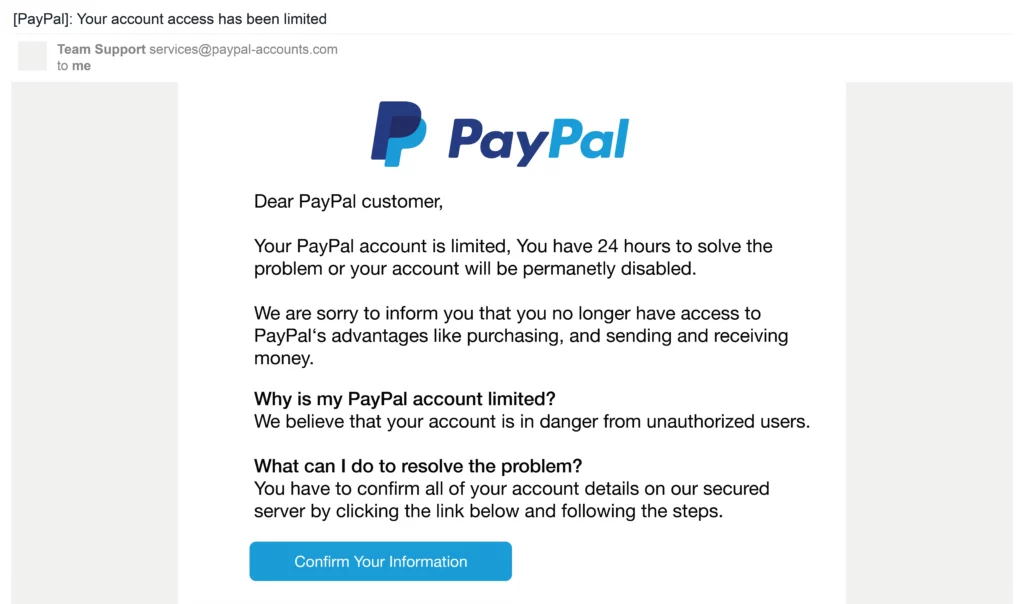
If you receive an email or text message that you suspect is phishing, do not click on any links or provide any personal information. Instead, open a new browser window and log into your PayPal account directly via PayPal’s official website. If there is an issue with your account, it will likely be indicated there. Always remember that PayPal will never ask for sensitive information via email or text message. If you accidentally already clicked on a phishing link from PayPal, read this guide and discover what to do after clicking on a phishing link.
How to report a scam on PayPal?
If you believe you’ve fallen victim to a PayPal scam, it’s important to report it immediately. Follow these steps:
- Log into your PayPal account.
- Look for the “Contact Us” option.
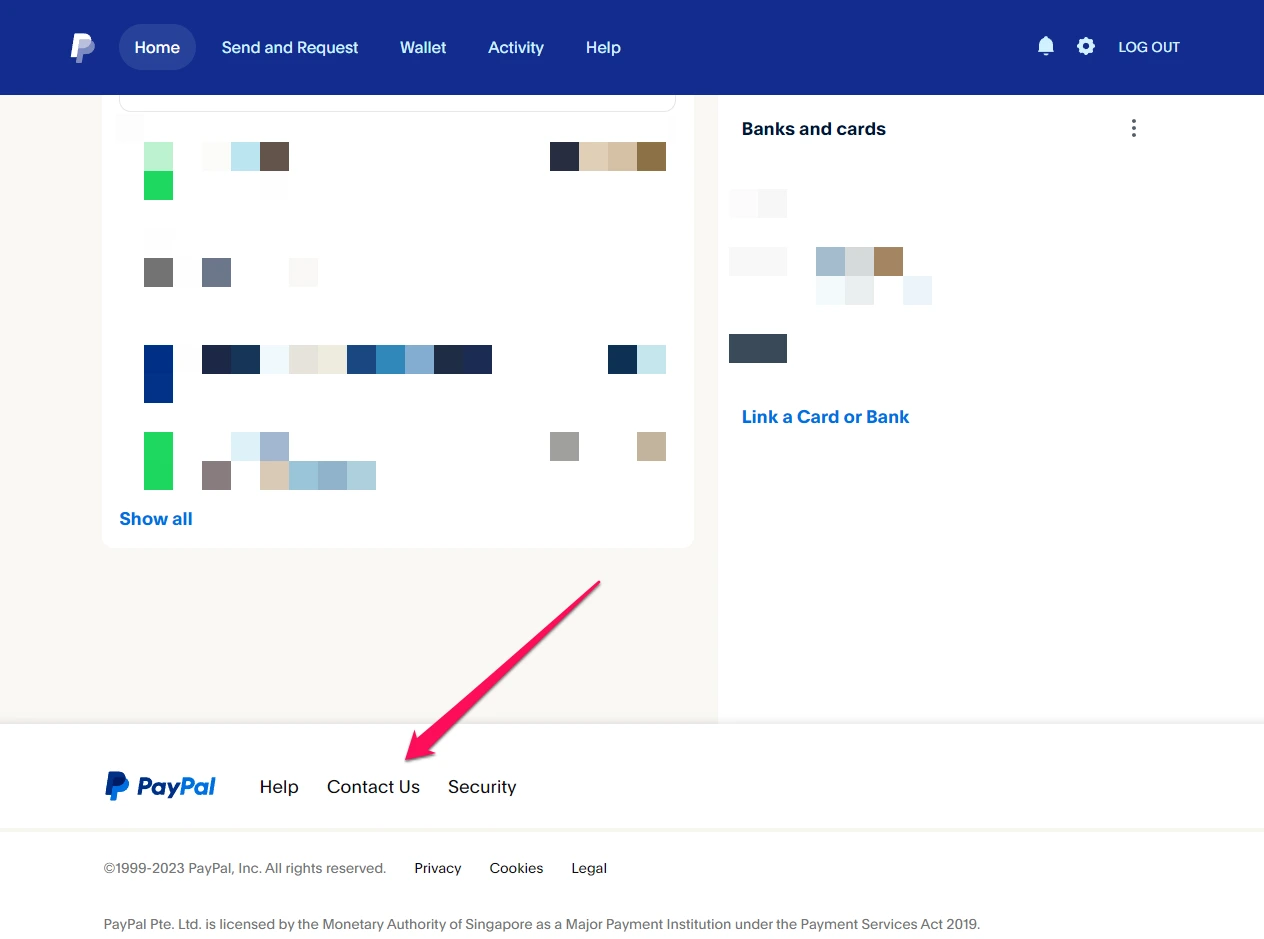
- On the next page, you will then see the option to message or call PayPal about the matter.
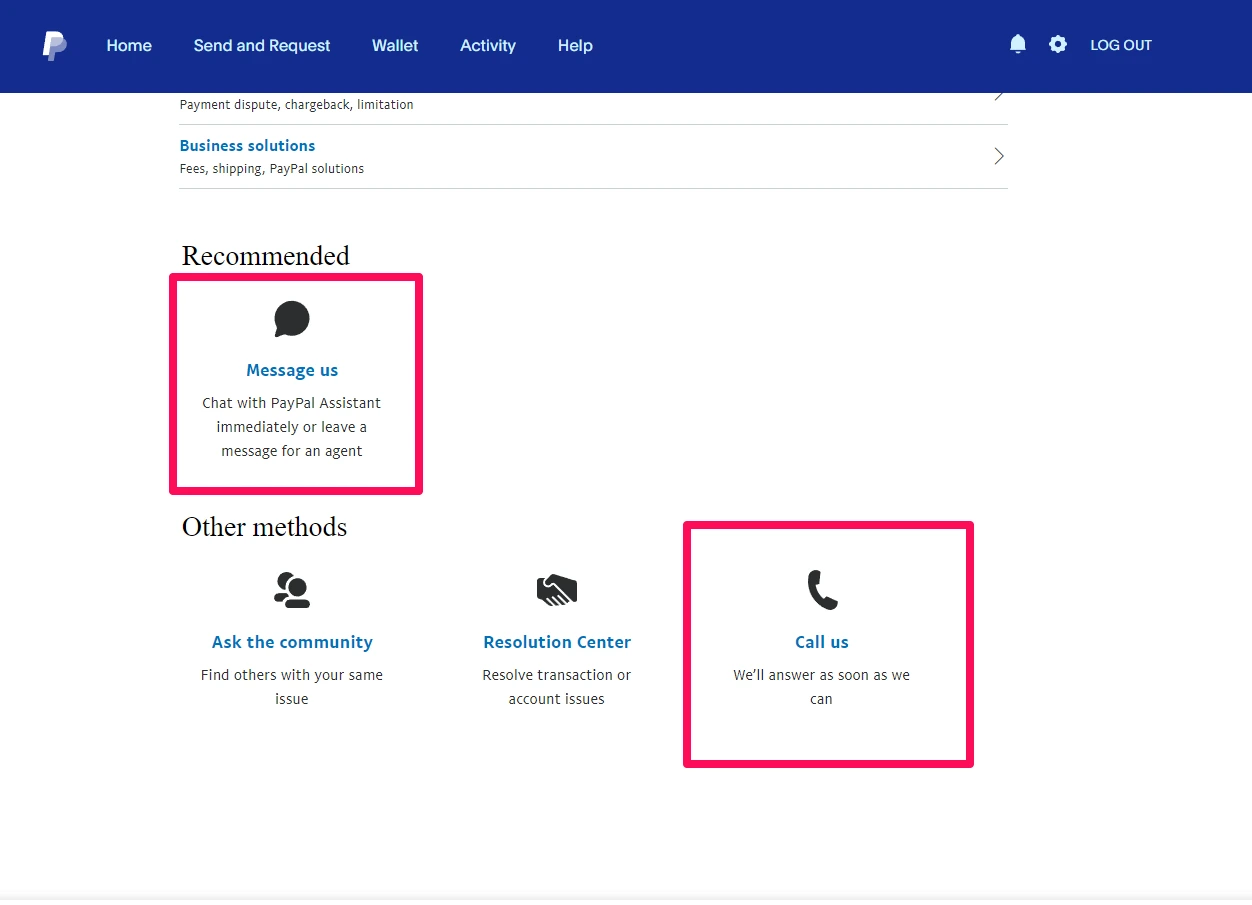
PayPal is committed to protecting its users from fraud and takes all reports of suspicious activity seriously. Once you submit your report, PayPal will investigate the issue and strive to resolve it as quickly as possible.
How to avoid scams on PayPal?
Being proactive is your best defense against scams on PayPal. Here are some tips to help you stay safe:
- Keep your account information secure. Do not share your PayPal login details with anyone.
- Change your PayPal password on a regular basis. Use something complex and unique, incorporating letters, numbers, and special characters.
- Enable multi-factor authentication on your PayPal account. That way, even if a scammer gets a hold of your password, they won’t be able to process any transaction without a code (sent via SMS).
- Double-check the sender’s email address. Remember that all official PayPal emails will come from an address that ends with “@paypal.com”.
- Beware of unofficial PayPal websites.The URL should always start with “https://www.paypal.com”
- Use secure and updated devices. Make sure you are using updated devices with the latest security patches and anti-virus software installed. This helps protect your information from hackers and scammers.
- Be cautious with unexpected requests: If you receive an unexpected payment request from a stranger or even a known contact, it could be a scam. Double-check with the person directly before making any payments.
FAQs
Will PayPal cover me if I get scammed?
The answer depends on the specific situation. PayPal provides buyer protection for eligible transactions. But this protection doesn’t cover all purchases or situations.
For example, PayPal may not reimburse you if you lost money to a phishing scam.
Is PayPal safer than bank transfers?
PayPal is generally safer than bank transfers. This is due to additional security measures like data encryption and fraud detection. This means that when you pay with PayPal, sellers don’t see any of your financial information.
